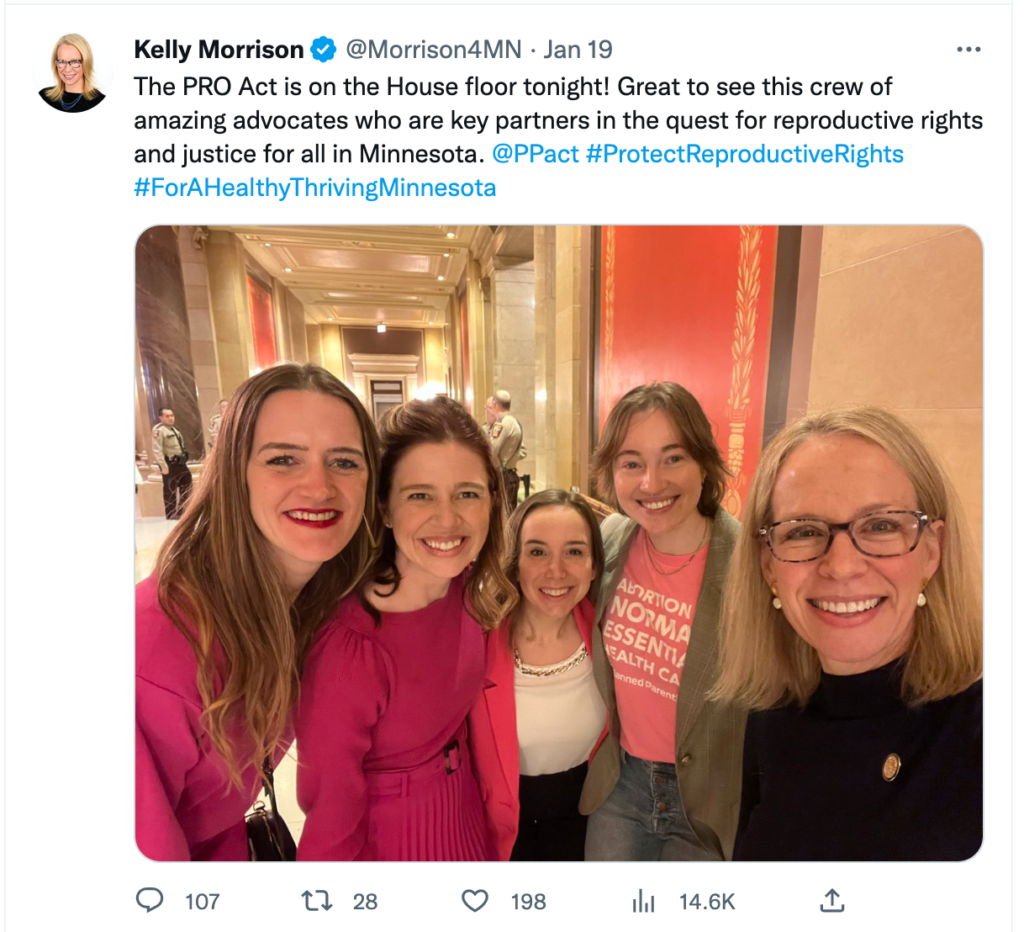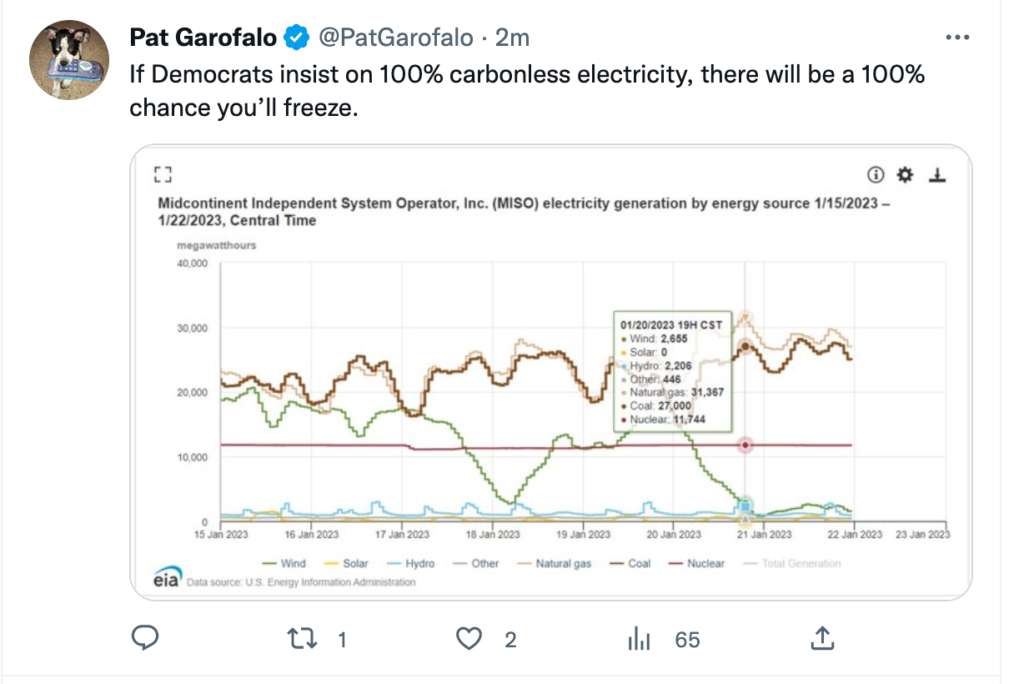Shock and awe at the Capitol
Week three of the 2023 legislative session is over, and the Democratic majorities in the House and Senate are taking full advantage of their new power. They are moving big items of their agenda through committee meetings at a very fast pace. It’s starting to look strategic and frankly, it’s a very good strategy. Moving the most controversial legislation quickly through the process prevents the opposition from mobilizing against it and builds tremendous pressure and momentum, preventing any Democrat from voting no or even asking to slow down. Democrats in swing districts are going to look back on this month during their reelection campaigns and say, “What was I thinking?”
Here’s a quick rundown on the big bills moving fast already in January.
Abortion
The Democrats made abortion the key issue in the 2022 campaign, and they are delivering on the one clear mandate they have: codifying the “right” to abortion into Minnesota state law. The liberal suburban women legislators driving this issue could not contain their giddiness as the bill passed the House, pausing to take selfies with activists outside the House chamber.

Despite all the attention over the issue, the bill that passed made zero changes to abortion access in Minnesota. The Doe v Gomez decision by the Minnesota Supreme Court in 1995 already guarantees a Roe-like right to abortion in the state. And Ramsey County District Judge Thomas Gilligan ruled last year that every common-sense restriction placed on abortion over the last 50 years was unconstitutional.
In their euphoria, House Democrats turned back every amendment to the bill offered by Republicans adding back some of the bi-partisan restrictions on abortion, including a ban on partial birth abortions. If the bill passes the Senate next week, Minnesota will continue to have the most extreme abortion regime in the world. Was that their mandate?
Marijuana
A new law legalizing recreational marijuana moved through a committee this week. Unlike the symbolic one-page abortion bill that changes nothing, the marijuana legislation is hundreds of pages, creates a new state bureaucracy and will have a huge impact on society. This far-reaching legislation will need stops in several House and Senate committees and will take weeks before reaching the floor.
A popular talking point for this bill is the claim that marijuana prosecutions have unduly affected minorities and that our prisons are full of Black men and women whose only offense was the non-violent possession or sale of marijuana. My colleague David Zimmer debunks this myth (and several others) in this long piece on marijuana legislation. Here are the numbers from his post:
- In 2022, the Minnesota Department of Corrections reported housing 7,800 inmates statewide. Of that total, just 15% were incarcerated for a drug offense, and just 3% for a marijuana offense. That represents a total of 36 inmates in our entire state prison system for a marijuana offense. These 36 inmates represent just .07% of all drug violations reported by the BCA annually.
- We don’t have an over-incarceration problem involving “low level drug offenders,” especially marijuana offenders. The state knows this and accordingly, identified saving only $522,000 over two years in Department of Correction costs through the legalization of marijuana.
There are only 36 inmates in Minnesota prison right now for a marijuana offense.
If Democrats and Gov. Walz want to legalize recreational marijuana, they should at least be honest about the motives. It’s not about equity in sentencing or incarceration.
100% Carbon free mandate
The bill to mandate all electricity from carbon-free sources passed a House committee this week. The testimony from bill authors and environmental groups was full of talking points on climate change and avoided any real discussion on the costs and benefits of this massive change in energy delivery.
As with everything at the Capitol these days, equity was mentioned more than cost. Apparently, our current energy policy is steeped in systemic racism as climate change affects minorities more than whites and minorities don’t have opportunities to participate in the new clean-energy economy because they can’t afford to buy solar panels for their homes. The 100% carbon-free bill will in fact, make things more equitable. EVERYONE will pay higher prices for electricity – an average of $3,800 per customer.
Policy Fellow Isaac Orr provided written testimony to the House committee against this bill and will continue educating anyone who will listen about the costs of this policy. If you haven’t sent an email to your representatives yet, we make it very easy here.
Question for Senators considering the bill this week: “Germany put all their eggs into a wind/solar basket and are now rationing energy to businesses and homeowners, crippling their economy and leaving many Germans literally out in the cold. What assurances do you have that the same thing won’t happen here in Minnesota if we follow the same path?”
Education spending
Gov. Walz proposed a K-12 education spending plan that commits the state to billions in new permanent funding. The money is there today because of the huge surplus we have, but these increases will no doubt saddle future legislatures with budget deficits. Walz doesn’t even pretend that more money will improve academic achievement or help Minnesota kids catch up from his school shutdowns during the pandemic.
His “World-Class Education” proposal includes several expensive items, none which are proven to improve academic achievement.

- School funding will now be tied to inflation, starting in 2026. It’s not clear which index Walz will use for inflation. Most people assume CPI, but Walz and his allies in the teachers’ union often cite an obscure inflation index known as the Implicit Price Deflator that will set education funding increases on automatic pilot.
- A 4% increase to the general education funding formula next year and a 2% increase the year after, which will cost an additional $717 million in 2024-2025 and $1.48 billion in 2026-2027. We currently spend over $10 billion per year on K-12 schools,
- Reduce the special education cross subsidy for school districts by 50%. This is a transparent bargaining ploy with the DFL legislature who will certainly eliminate 100% of the cross subsidy, with Walz “giving in” to their demands.
- Building on the success of the Feeding Our Future program, the state will now provide universal school meals at a cost of $389 million in 2023-2025 and $424 million in 2026-2027. Whoever said there was no such thing as a free lunch obviously doesn’t live in the Republik of Minnesota.
Walz’s proposal was silent on the Senate Education Committee’s top priority — providing period products in all bathrooms, boys and girls, from fifth grade through high school. Because as Rep. Sandra Feist (DFL-New Brighton) put it, “Not all students who menstruate are female.” That statement pretty much sums up where we’re at after the third week of complete Democratic rule at the Capitol in St. Paul.
Click here to get caught up on all Capitol Watch newsletters from this legislative session!
Subscribe to Capitol Watch
Minnesota political news from an insider’s perspective.